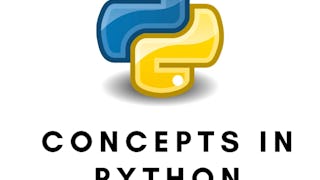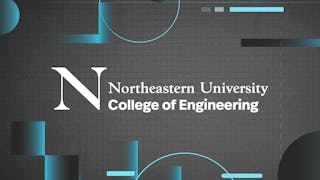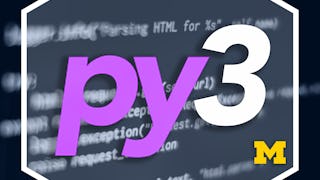A lot of code is building up from the most basic primitive elements of the language to increasingly faithful and meaningful things. In this course you will see how to author more complex ideas and capabilities in Python. In technical terms, you will learn dictionaries and how to work with them and nest them, functions, refactoring, and debugging, all of which are also thinking tools for the art of problem solving. We'll use this knowledge to explore our browsing history, interrogate a tweet, and draw pictures.

Cultivate your career with expert-led programs, job-ready certificates, and 10,000 ways to grow. All for $25/month, billed annually. Save now


Python Basics: Problem Solving with Code
This course is part of Python Basics for Online Research Specialization

Instructor: Seth Frey
Included with 
What you'll learn
Explore your own web browsing habits and manage code complexity and reading manuals.
Discuss how Python understands complex and real world things, and practice looking under the hood of a single tweet.
Apply the building blocks of Python and turn it into a little language for drawing pictures.
Practice "debugging" code and learn to think the way code thinks.
Details to know

Add to your LinkedIn profile
4 assignments
See how employees at top companies are mastering in-demand skills

Build your subject-matter expertise
- Learn new concepts from industry experts
- Gain a foundational understanding of a subject or tool
- Develop job-relevant skills with hands-on projects
- Earn a shareable career certificate


Earn a career certificate
Add this credential to your LinkedIn profile, resume, or CV
Share it on social media and in your performance review

There are 4 modules in this course
Can you use code to learn about...yourself? We're starting this course with a module in which you explore web browsing habits. If you installed the plugins for tracking your web history, you'll be able to explore your own. As this code gets more involved, you'll also get more advice on managing code complexity and reading manuals. Let's get started!
What's included
3 videos5 readings1 assignment1 programming assignment2 discussion prompts
Understanding how Python understands the world brings us to "dictionaries", which are kind of like lists, but they allow more variety and structure. This module will build up to representing increasingly complex real world things. We will build up to looking under the hood of a single tweet, and understanding the "social" in "social media".
What's included
10 videos1 assignment1 programming assignment1 discussion prompt
Everything you've learned in this course about Python is just basic building blocks that programmers use to build bigger building blocks of their own. In this module, we'll do precisely that, turning Python into a little language for drawing pictures, a DIY MS Paint.
What's included
8 videos1 reading1 assignment1 programming assignment1 discussion prompt
A major part of programming that no one ever tells you about is "debugging": spending seconds, minutes, hours, or even days going through code that should work to understand why it doesn't. This demoralizing subject stops a lot of beginners, but there is a way to be good at it, and that is a major part of learning to think the way code thinks.
What's included
5 videos2 readings1 assignment2 discussion prompts
Instructor

Offered by
Recommended if you're interested in Algorithms


Microsoft


Coursera Project Network


Northeastern University


University of Michigan
Why people choose Coursera for their career




New to Algorithms? Start here.

Open new doors with Coursera Plus
Unlimited access to 10,000+ world-class courses, hands-on projects, and job-ready certificate programs - all included in your subscription
Advance your career with an online degree
Earn a degree from world-class universities - 100% online
Join over 3,400 global companies that choose Coursera for Business
Upskill your employees to excel in the digital economy
Frequently asked questions
Access to lectures and assignments depends on your type of enrollment. If you take a course in audit mode, you will be able to see most course materials for free. To access graded assignments and to earn a Certificate, you will need to purchase the Certificate experience, during or after your audit. If you don't see the audit option:
The course may not offer an audit option. You can try a Free Trial instead, or apply for Financial Aid.
The course may offer 'Full Course, No Certificate' instead. This option lets you see all course materials, submit required assessments, and get a final grade. This also means that you will not be able to purchase a Certificate experience.
When you enroll in the course, you get access to all of the courses in the Specialization, and you earn a certificate when you complete the work. Your electronic Certificate will be added to your Accomplishments page - from there, you can print your Certificate or add it to your LinkedIn profile. If you only want to read and view the course content, you can audit the course for free.
If you subscribed, you get a 7-day free trial during which you can cancel at no penalty. After that, we don’t give refunds, but you can cancel your subscription at any time. See our full refund policy.
More questions
Financial aid available,

